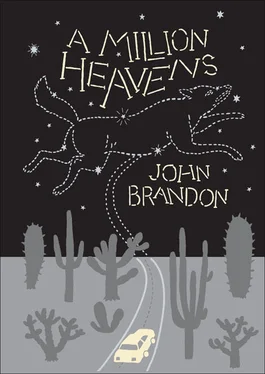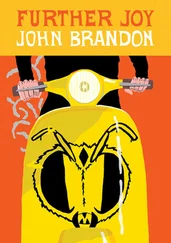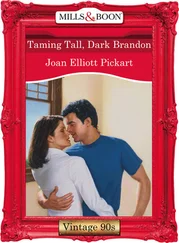Gee was the first person he’d let in Soren’s room who wasn’t part of the clinic staff, his first social visitor. She usually stayed about an hour, and while she was in the room Soren’s father felt relief from his loneliness but he also felt intruded upon. The clinic wasn’t fun or freeing like when they went out to dinner. Gee always went over to Soren when she arrived and again right before she left and pressed her forehead against him and whispered things to him that Soren’s father couldn’t hear. She never brought flowers, but often she brought food. Today she had éclairs, and though Soren’s father wasn’t wild about sweets he ate one and made sure to seem he was enjoying it. Gee had also brought coffee. She couldn’t stomach the clinic brew.
She finished eating and stood at the window with her short foam coffee cup, a look of certainty on her face that for some reason irked Soren’s father.
“Albuquerque is so ugly, it’s beautiful.” Gee’s coffee cup was making a patch of fog on the window. “God made this place ugly and humans made it uglier, and that was just what it needed. It needed to be uglier.”
Soren’s father knew he wasn’t required to respond to such statements. Especially here in Soren’s room, he could stay as quiet as he liked. Gee came away from the window and sat. The chairs were orange and the table was small and high. She told Soren’s father she was through with the art world. She was through consulting on galleries and she was through with her own art too.
“I’m making the same roadrunner over and over. That’s not art, it’s craft.”
Soren’s father told Gee he’d seen a real roadrunner out the window earlier that day, strolling right down the roadside.
“The real thing is always better than the artifice.”
“Thanks for the coffee,” Soren’s father said. He tipped his cup toward her.
“I’ve had enough food of the spirit. I’m ready to deal with food of the stomach.”
“The restaurant,” Soren’s father said.
“I found a space that would be suitable. Not perfect, but suitable. I paid them to hold it for me a couple weeks.”
“You must be about ready to reveal the idea.”
“I am. Asian-influenced chicken wings, served with watermelon.” Gee’s eyebrows perked.
“Is that an appetizer?”
“That’s the whole menu.”
“Oh, okay,” said Soren’s father.
Gee explained that the wings would boast a more complex spice pallet than usual hot wings, and the watermelon was a Southern twist on celery and tasted better than celery. Instead of bleu cheese, she was concocting her own dipping sauce with local goat cheese as the base.
“If you’re cooking it, I’m sure it’ll be good,” Soren’s father said.
Gee gave him a long look but didn’t say anything. She was deciding, Soren’s father knew, if it was the right time to talk to him about going in with her. She’d talked about it before and she would talk about it again. Soren’s father was enjoying a break from loneliness, but he was also looking forward to being alone in the room again. It was a wrong feeling, he knew. Gee was wonderful. That was a fact. He was craving solitude and he also found that for some reason he was looking forward to the next vigil in the parking lot. That was the kind of company he wanted, company that was quiet and didn’t know what it was after. Soren’s father had purposely never invited Gee over on a Wednesday. She seemed totally unaware of the phenomenon of the vigils and that was okay with him. He didn’t care to hear her opinion on the matter.
“Once I commit to this,” she said, “I’m in for about seventy hours a week. That’s doing it without quality help.”
Soren’s father set his jaw. He didn’t take a sip of coffee or glance over at his son.
“It would be nice to get my memoir in order, but this space won’t sit around forever. I guess it’s just as well. I’m a chef, not a writer.”
“You’re a lot of things. You got enough brains and heart to make four or five women.” Soren’s father blinked his eyes clear. “And here I am this one old man.”
Walking away from Lofte, he thirsted for the arrival of night and the true cold. He had been close to putting it off again, close to not leaving for yet another day, those days that turned into weeks and into worse, but he had not put it off this time. He’d eaten his last meal from the diner. He’d chugged a beer and slammed the can down and locked the doors of his house. He’d laced up his boots. He’d spat on the tame dirt of Lofte and had put one foot in front of the other. He was scared but he didn’t care about that. He headed west, his pack already heavy, his face to the sun. His legs were prickly with exertion. Parts of him were being roused from long disuse. He was doing it, going into the desert. In no time Lofte looked tiny behind him. In no time he had the town in perspective. It wouldn’t disappear from view, though. It stayed, minute but stuck on the horizon, until the gas station owner got rid of it by veering north around a hulking dune.
Forty days and forty nights. This was day one. The direction he was heading there were no towns. If he spotted an over-serious hiker or drug lab he would give a wide berth. He didn’t have enough food for forty days, and his water would be gone in a week. Forty days and this was day one. The gas station owner thought of all the nuclear geeks shipped over to this bleak land and charged with creating a weapon that could make any land bleak. He thought of these men who’d never wondered about their purpose, who’d fallen asleep and awakened thinking of the same thing always, whose greatest love and greatest fear had been in their brains all along. The gas station owner lived in his body and keeping that body alive would become his obsession. Forty days and forty nights. He knew he was mixing science and religion, but neither had a claim on him. He was going to force the desert to claim him, to claim his life or claim him as an equal.
She didn’t want the vigil to end, but as always the hour came when the group naturally and wordlessly felt that it was time to rise. There were seven of them remaining. They’d lost the painter. Dannie had no idea what kind of painter he was, if he wiled away his mornings on corny watercolors or if he painted houses or if he touched up signs for the city. The fewer people that remained, the more it troubled Dannie when they lost someone. Each departure, at this point, felt like a betrayal of the group. They weren’t a mass anymore. They wouldn’t have been able to field a softball team. Dannie had seen bands with more members. They’d lost the fat hopeful women. They’d lost the guy with the sunglasses. Dannie had singled out one of the remaining vigilers, the college girl who was getting skinnier by the week but only ever wore baggy clothes. This girl would not abandon Dannie. When the others left, as they were bound to, Dannie wouldn’t despair. She had the girl. Maybe she didn’t have Arn the way she used to, but Dannie had this girl.
Arn had sat next to Dannie and had held her hand for a while, out of obligation, but the quiet charge of intimacy was gone. Now it was simple wordlessness between them. It was like they were relieved to be at the vigils because they couldn’t talk. They had made love that afternoon and it seemed to Dannie they were performing out of fear, acting. Arn would never admit they were growing apart, and Dannie hated him for that. She was the one who had to initiate anything unpleasant. Like she had initiated everything pleasant. They never raised their voices with each other, which made the idea of breaking up seem unapproachable. She’d never slapped him. He’d never wrenched her roughly by the arm.
Читать дальше












